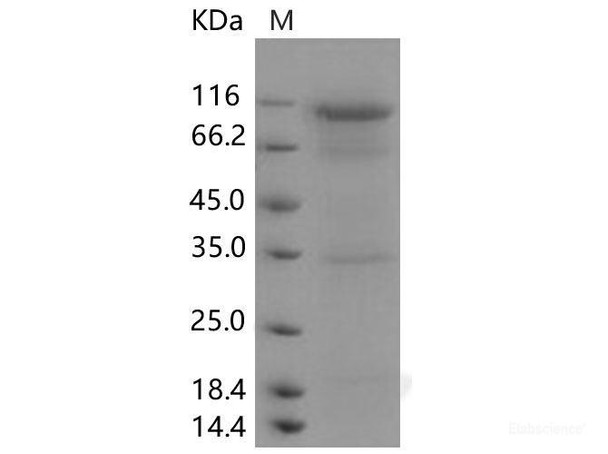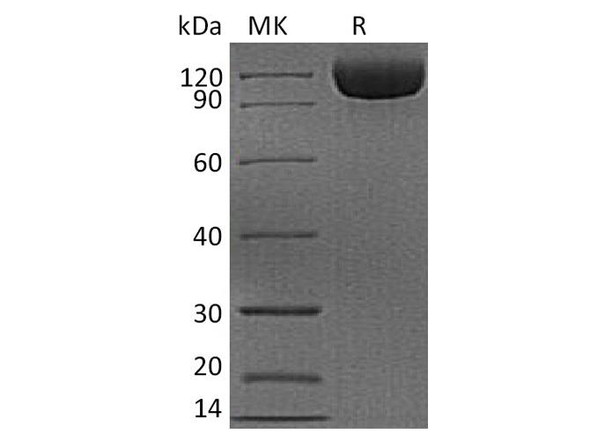Description
| Product Name: | Human DPP4/CD26 Recombinant Protein (Active) |
| Product Code: | RPES6173 |
| Size: | 50µg |
| Species: | Human |
| Expression Host: | HEK293 Cells |
| Synonyms: | ADABP Protein, Human, ADCP2 Protein, Human, CD26 Protein, Human, DPPIV Protein, Human, TP103 Protein, Human |
| Application: | Immunogen |
| Mol Mass: | 85.4kDa |
| AP Mol Mass: | 95 kDa |
| Tag: | None |
| Purity: | > 70 % as determined by reducing SDS-PAGE. |
| Endotoxin Level: | < 1.0 EU per μg of the protein as determined by the LAL method. |
| Bio Activity: | 1. Measured by its ability to cleave the fluorogenic peptide substrate, Gly-Pro-7-amido-4-methylcoumarin (GP-AMC). The specific activity is > 2, 500 pmoles/min/μg. 2. Using the Octet RED System, the affinity constant (Kd) of Recombinant Human DPP4/CD26 Protein(Active) bound to Recombinant MERS-CoV Spike Protein (S1+S2 ECD, aa 1-1297, His Tag) was 33 nM. 3. Using the Octet RED System, the affinity constant (Kd) of Recombinant Human DPP4/CD26 Protein(Active) bound to Recombinant HCoV-HKU1 (Isolate N1) S1 Protein (His Tag) was 12 nM. |
| Sequence: | Asn29-Pro766 |
| Accession: | NP_001926.2 |
| Storage: | Generally, lyophilized proteins are stable for up to 12 months when stored at -20 to -80°C. Reconstituted protein solution can be stored at 4-8°C for 2-7 days. Aliquots of reconstituted samples are stable at < -20°C for 3 months. |
| Shipping: | This product is provided as lyophilized powder which is shipped with ice packs. |
| Formulation: | Lyophilized from sterile 100mM NaCl, 50mM Tris, pH 7.5 Normally 5 % - 8 % trehalose, mannitol and 0.01% Tween80 are added as protectants before lyophilization. Please refer to the specific buffer information in the printed manual. |
| Reconstitution: | Please refer to the printed manual for detailed information. |
| Background: | Dipeptidyl peptidase-4 (DPP4) or adenosine deaminase complexing protein 2 (ADCP 2) or T-cell activation antigen CD26 is a serine exopeptidase belonging to the S9B protein family that cleaves X-proline dipeptides from the N-terminus of polypeptides, such as chemokines, neuropeptides, and peptide hormones. The enzyme is a type II transmembrane glycoprotein, expressed on the surface of many cell types. It is also present in serum and other body fluids in a truncated form (sCD26/DPPIV). The soluble CD26 (sCD26) as a tumour marker for the detection of colorectal cancer (CRC) and advanced adenomas. As both a regulatory enzyme and a signalling factor, DPP4 has been evaluated and described in many studies. DPP4 inhibition results in increased blood concentration of the incretin hormones glucagon-like peptide-1 (GLP-1) and gastric inhibitory polypeptide (GIP). This causes an increase in glucose-dependent stimulation, resulting in a lowering of blood glucose levels. Recent studies have shown that DPP4 inhibitors can induce a significant reduction in glycosylated haemoglobin (HbA(1c)) levels, either as monotherapy or as a combination with other antidiabetic agents. Research has also demonstrated that DPP4 inhibitors portray a very low risk of hypoglycaemia development, and are a new pharmacological class of drugs for treating Type 2 diabetes. |






